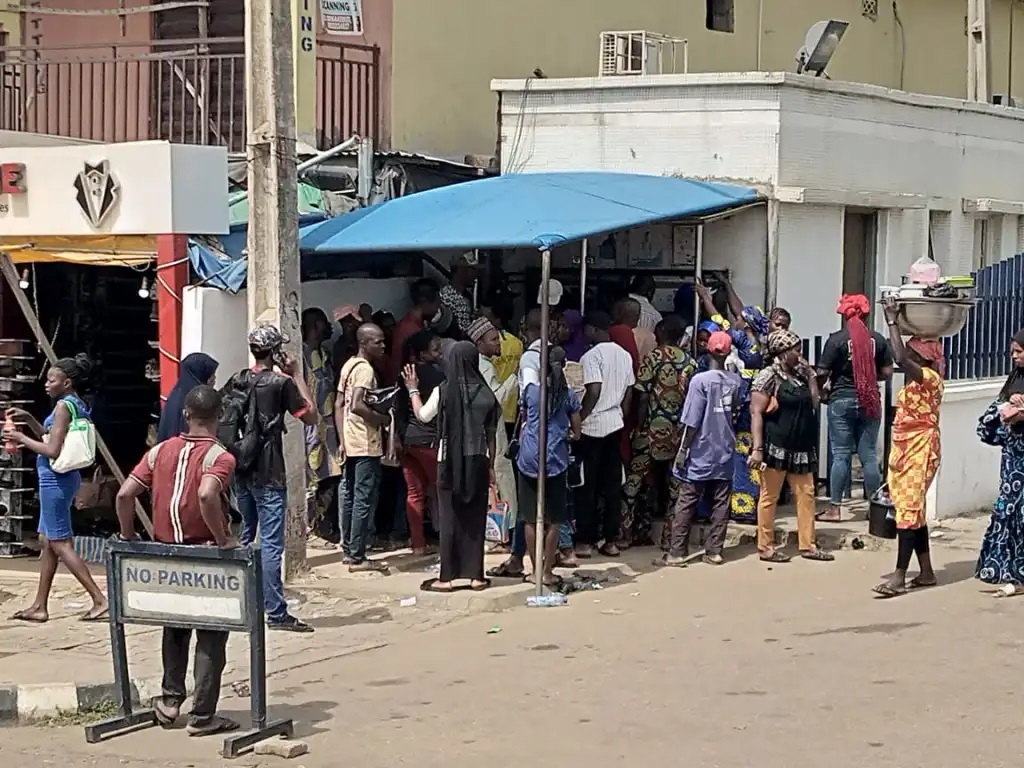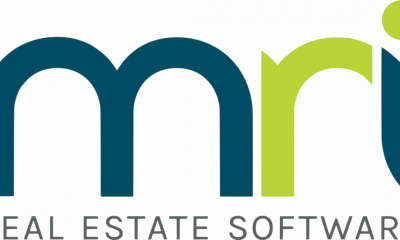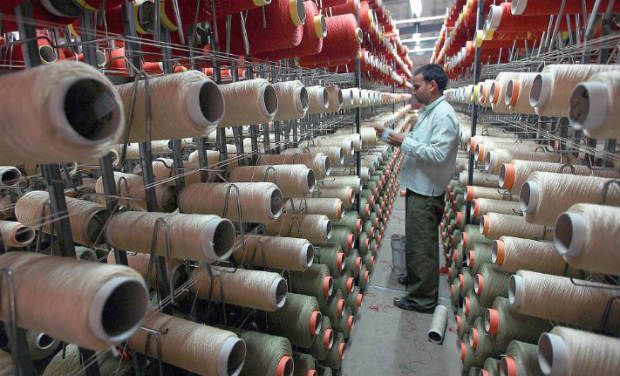Economy
Business Activity Falls First Time in Eight Months

By Modupe Gbadeyanka
The Stanbic IBTC Purchasing Managers’ Index (PMI) for July 2024 has indicated that the Nigerian private sector moved back into contraction territory.
A statement from the lender disclosed that the index of the performance of the business environment closed at 49.2 points compared with 50.1 points recorded in June as steep price pressures hit demand and resulted in renewed reductions in both business activity and new orders.
Business Post reports that readings above 50.0 signal an improvement in business conditions in the previous month, while readings below 50.0 show deterioration, which occurred in the period under review, the first in eight months.
Input costs and selling prices continued to rise rapidly, although there were some signs that efforts to secure sales resulted in a softer pace of output price inflation.
The renewed worsening in the health of the private sector mainly reflected the first reductions in output and new orders since November last year. In both cases, rates of decline were only modest.
Anecdotal evidence continued to highlight the negative impact of sharp price increases on customer demand, with clients often unwilling or unable to commit to new projects.
Three of the four broad sectors covered by the report saw business activity decrease in July, the exception being manufacturing where production increased.
Selling prices continued to increase sharply at the start of the third quarter as companies passed higher input costs through to their customers. This was despite the rate of inflation easing to the slowest since May 2023 amid reports from some panellists that they had lowered charges as part of efforts to secure sales.
The Head of Equity Research for West Africa at Stanbic IBTC Bank, Mr Muyiwa Oni, said, “The Stanbic IBTC headline PMI declined for the second consecutive month to 49.2 points in July – its lowest level since November 2023.
“Anecdotal evidence continued to highlight the negative impact of sharp price increases on customer demand, resulting in renewed reductions in both business activity and new orders.
“Notably, output and new orders printed below 50.0 thereby ending a seven-month sequence of expansion and reinforcing a renewed worsening in the health of the private sector.
“Even as output and new orders declined, companies continued to expand their staffing levels during the month. Moreover, the rate of job creation picked up to the strongest in 2024 so far.
“Meanwhile, overall input prices continued to rise sharply in July with the rate of inflation quickening for the third month running and were the fastest since March.
“Although output prices continued to rise rapidly during July, the pace of inflation eased from that seen in June and was the slowest since May 2023. Where selling prices increased, panellists linked this to higher input costs.
“On the other hand, some companies lowered charges as part of efforts to attract customers. That said, companies remained confident overall that output will increase over the next 12 months, reflecting business expansion plans including efforts to start exporting and open more branches.
“On a year-on-year basis, headline inflation may have peaked in June, with moderation expected in H2:24 as the year-on-year effects of PMS subsidy removal (which induced higher fuel prices) and significant currency depreciation (which accompanied the FX unification) fade.
“This, in addition to the commencement of the primary harvest season in September, is likely to provide some respite for consumers, thereby likely supporting a slight improvement in domestic economic activities in H2:24.”
Further increases in purchase prices and staff costs were registered in July. Purchase price inflation quickened to a four-month high, often due to currency weakness but also higher raw material costs.
Meanwhile, the rise in employee expenses was broadly in line with that seen in June as companies continued to help workers with higher living costs, particularly those related to transportation.
The renewed decline in output was accompanied by a reduction in business confidence, with firms at their least optimistic since the survey began. That said, business expansion plans meant that firms still expected output to rise over the coming year.
Companies scaled back purchasing activity, with reduced demand for inputs and prompt payments helping lead to a further shortening of suppliers’ delivery times.
Meanwhile, stocks of inputs increased. Employment also continued to rise slightly, with the pace of job creation quickening to the fastest in 2024 so far. Higher staffing levels and a drop in new orders meant that backlogs of work were cleared for the second consecutive month.
Economy
Seven Price Gainers Boost NASD OTC Bourse by 2.19%

By Adedapo Adesanya
Seven price gainers flipped recent declines at the NASD Over-the-Counter (OTC) Securities Exchange, raising the alternative stock market by 2.19 per cent on Friday.
According to data, the market capitalisation added N51.24 billion to end N2.389 trillion compared with the previous day’s N2.338 trillion, while the NASD Unlisted Security Index (NSI) climbed 85.65 points to close at 3,994.32 points, in contrast to the 3,908.67 points it ended a day earlier.
Business Post reports that the advancers were led by MRS Oil Plc, which improved its value by N13.00 to N200.00 per share from N187.00 per share, FrieslandCampina Wamco Nigeria Plc gained N7.40 to settle at N91.55 per unit versus the previous day’s N84.15 per unit, Central Securities Clearing System (CSCS) Plc appreciated by N6.08 to N71.00 per share from N64.92 per share, Afriland Properties Plc added 66 Kobo to finish at N17.17 per unit versus N16.51 per unit, IPWA Plc rose 37 Kobo to N4.15 per share from N3.78 per share, First Trust Mortgage Bank Plc grew by 11 Kobo to N1.20 per unit from N1.09 per unit, and Food Concepts Plc went up by 10obo to N3.70 per share from N3.60 per share.
On the flip side, there were two price losers led by Geo-Fluids Plc, which depreciated by 28 Kobo to N3.32 per unit from N3.60 per unit, and Industrial and General Insurance (IGI) Plc dropped 5 Kobo to sell at 45 Kobo per share from 50 Kobo per share.
Yesterday, the volume of trades went down by 92.0 per cent to 3.7 million units from 45.8 million units, the value of transactions fell by 59.4 per cent to N84.5 million from N208.2 million, while the number of deals went up by 7.7 per cent to 42 deals from 39 deals.
CSCS Plc remained the most traded stock by value (year-to-date) with 32.6 million units exchanged for N1.9 billion, trailed by Geo-Fluids Plc with 119.6 million units valued at N470.3 million, and Resourcery Plc with 1.05 billion units traded at N408.6 million.
Resourcery Plc closed the day as the most traded stock by volume (year-to-date) with 1.05 billion units sold for N408.7 million, followed by Geo-Fluids Plc with 119.6 million units worth N470.3 million, and CSCS Plc with 32.6 million units worth N1.9 billion.
Economy
FX Demand Worries Weaken Naira to N1,346/$1 at Official Market

By Adedapo Adesanya
The Naira weakened further against the United States Dollar in the Nigerian Autonomous Foreign Exchange Market (NAFEX) on Friday, February 20, by N4.97 or 0.37 per cent to N1,346.32/$1 from the N1,341.35/$1 it was transacted on Thursday.
Heightened FX demand tilted the market toward the downside yesterday, exerting upward pressure on rates despite efforts by the Central Bank of Nigeria (CBN) to stabilise the foreign exchange market.
Also in the official market, the domestic currency depreciated against the Pound Sterling during the session by N9.39 to sell for N1,815.25/£1 versus the previous day’s N1,805.86/£1, and lost N7.33 against the Euro to close at N1,584.62/€1 compared with the preceding session’s N1,577.29/€1.
The story was not different for the Nigerian Naira at the GTBank FX desk, where it depleted against the Dollar by N7 on Friday to quote at N1,356/$1 versus the N1,349/$1 it was sold a day earlier, but remained unchanged in the black market at N1,370/$1.
It was observed that risky sentiment among Foreign Portfolio Investors (FPIs) contributed to the FX market, amid fears of hot money flight due to capital gains tax and other factors.
As for the cryptocurrency market, it was mostly green yesterday in reaction to a Supreme Court verdict dismissing a fresh 10 per cent global levy by President Donald Trump.
The apex court on Friday described Mr Trump’s global tariff rollout as illegal. The decision did not clarify what should happen to tariff revenue already collected, and it doesn’t necessarily spell the end of the trade agenda, with multiple legal and executive avenues still available.
Litecoin (LTC) grew 2.7 per cent to $55.00, Cardano (ADA) appreciated 2.6 per cent to trade at $0.2815, Binance Coin (BNB) expanded by 2.6 per cent to $627.19, Dogecoin (DOGE) recouped 1.3 per cent to quote at $0.1, Ripple (XRP) jumped 0.7 per cent to $1.43, Solana (SOL) improved by 0.5 per cent to $84.15, and Ethereum (ETH) soared 0.1 per cent to $1,962.78.
However, Bitcoin (BTC) lost 0.2 per cent to sell for $67,850.49, while the US Dollar Tether (USDT) and the US Dollar Coin (USDC) traded flat at $1.00 each.
Economy
Fidson, Jaiz Bank, Others Keep NGX in Green Territory

By Dipo Olowookere
A further 0.99 per cent was gained by the Nigerian Exchange (NGX) Limited on Friday after a positive market breadth index supported by 53 price gainers, which outweighed 23 price losers, representing bullish investor sentiment.
During the trading day, the trio of Jaiz Bank, Fidson, and NPF Microfinance Bank chalked up 10.00 per cent each to sell for N11.00, N86.90, and N6.27, respectively, while Deap Capital appreciated by 9.96 per cent to N7.62, and Mutual Benefits increased by 9.94 per cent to N5.42.
Conversely, Secure Electronic Technology shed 10.00 per cent to trade at N1.62, Sovereign Trust Insurance slipped by 9.73 per cent to N2.32, Ellah Lakes declined by 7.91 per cent to N12.80, International Energy Insurance retreated by 5.56 per cent to N3.40, and ABC Transport moderated by 5.26 per cent to N9.00.
Data from Customs Street revealed that the insurance counter was up by 2.52 per cent, the industrial goods sector grew by 2.28 per cent, the banking space expanded by 1.43 per cent, the consumer goods index gained 1.23 per cent, and the energy industry rose by 0.05 per cent.
As a result, the All-Share Index (ASI) went up by 1,916.20 points to 194,989.77 points from 193,073.57 points, and the market capitalisation moved up by N1.230 trillion to N125.164 trillion from Thursday’s N123.934 trillion.
Yesterday, investors traded 820.5 million stocks valued at N28.3 billion in 63,507 deals compared with the 898.5 million stocks worth N38.5 billion executed in 61,953 deals, showing a jump in the number of deals by 2.51 per cent, and a shortfall in the trading volume and value by 8.68 per cent and 26.49 per cent apiece.
Closing the session as the most active equity was Mutual Benefits with 79.0 million units worth N427.1 million, Zenith Bank traded 44.0 million units valued at N3.8 billion, Chams exchanged 43.9 million units for N182.0 million, AIICO Insurance transacted 42.4 million units valued at N179.8 million, and Veritas Kapital sold 36.0 million units worth N90.6 million.
-

 Feature/OPED6 years ago
Feature/OPED6 years agoDavos was Different this year
-
Travel/Tourism10 years ago
Lagos Seals Western Lodge Hotel In Ikorodu
-

 Showbiz3 years ago
Showbiz3 years agoEstranged Lover Releases Videos of Empress Njamah Bathing
-

 Banking8 years ago
Banking8 years agoSort Codes of GTBank Branches in Nigeria
-

 Economy3 years ago
Economy3 years agoSubsidy Removal: CNG at N130 Per Litre Cheaper Than Petrol—IPMAN
-

 Banking3 years ago
Banking3 years agoSort Codes of UBA Branches in Nigeria
-

 Banking3 years ago
Banking3 years agoFirst Bank Announces Planned Downtime
-

 Sports3 years ago
Sports3 years agoHighest Paid Nigerian Footballer – How Much Do Nigerian Footballers Earn






















